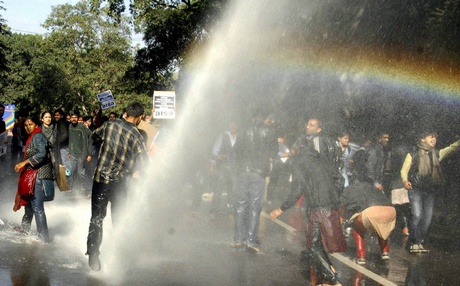
New Delhi, December 22: Delhi Police on Saturday used water cannons to disperse protesters who were marching towards Rashtrapati Bhavan demanding justice for the 23-year-old gang rape victim.
Hundreds of young students on Saturday marched towards Rashtrapati Bhavan as protests demanding justice for the 23-year-old gangrape victim continued for the sixth day, with former Army Chief V K Singh joining the protesters at India Gate.
The youths gathered at India Gate on Saturday morning and marched through Rajpath towards Raisina Hills where Rashtrapati Bhavan, Prime Minister's Office and home ministry are located.
The young students broke security cordons erected on Rajpath and managed to reach near Raisina Hills where they were stopped.
On Friday, the capital also saw protesters march towards Rashtrapati Bhavan.
"You see this problem is because of systemic failure of governance. Police reforms have been lying in cold storage for the last so many years. Why haven't they done anything about it? Why do we have to hear such things from a police commissioner saying that he doesn't have man-power? It is shameful," Singh said.
"Why do you have to see the spectacle on television where ministry of home officials have to go out on the streets checking things? Isn't there a failure? This needs to be addressed. This failure comes because of political and bureaucratic apathy in this country," the former Army chief said.







Comments
Add new comment